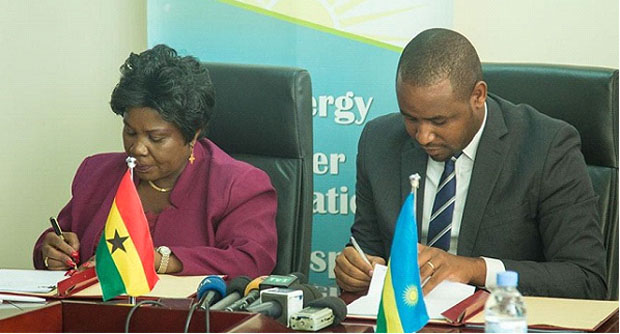Cecilia Abena Dapaah and Eng. Jean De Dieu signing the aggrement
The Minister for Aviation, Cecilia Abena Dapaah, on behalf of the Republic of Ghana signed a Bilateral Air Service Agreement (BASA) with the Republic of Rwanda at a colorful ceremony held at the Ministry of Infrastructure in Kigali on 21st May, 2018.
The agreement will enable designated airlines of the two contracting states to operate international commercial passenger and cargo flights between both states.
The agreement, which is in line with the provisions of the Yamoussoukro Decision and the Single African Air Transport Market (SAATM) on air transport liberalization, seeks to ensure that eligible airlines of both states enjoy full traffic rights, including 5th Freedom traffic rights within Africa. Under the liberalised regime, there are no restrictions on aircraft capacity and frequency of flights.
Speaking at the event, Ms Dapaah said air travel is essential to Africa, as it enhances connectivity and trade, increases job creation, drives tourism and economic growth.
She further stated that “although the African air transport industry currently supports nearly seven million jobs and US$80 billion in GDP, it faces numerous challenges that hinder the potential growth of the industry.”
Some of these challenges include poor intra-African connectivity, inadequate infrastructure and weak human capacity.
She stated that the provision of efficient air transport services on the Accra-Kigali Route would be mutually beneficial to both states and pledged that Ghana would ensure the continuous provision of safety and security oversight of air operations.
On his part, the Minister of State in-charge of Transport Eng. Jean De Dieu Uwihanganye, who signed the agreement for the Republic of Rwanda, explained that the event marks the first and very important step towards the fulfillment of constitutional formalities to give full legal effect to the BASA.
He said the move would not only boost ties between the two countries but also provide more reliable and predictable air services between and beyond the territories of both states.
The Accra-Rwanda route is currently served by RwandAir, which operates four weekly frequencies through Abuja.
Ghana is steadily becoming an aviation hub within West Africa and a destination of choice for many air travelers.
It recently embarked on strategic infrastructural developments, including the construction of a new passenger terminal at the Kotoka International Airport (KIA) with the capacity to handle five million passengers annually.


